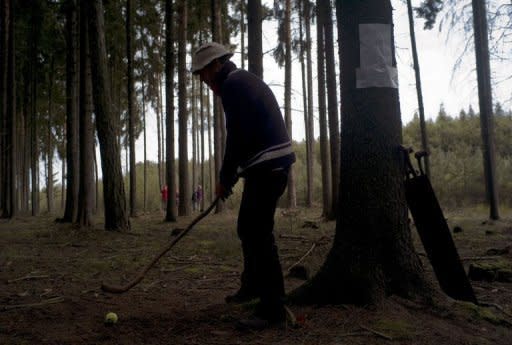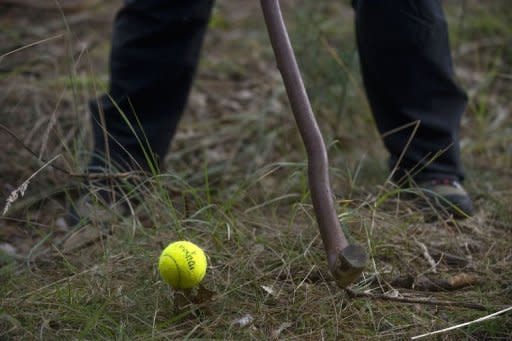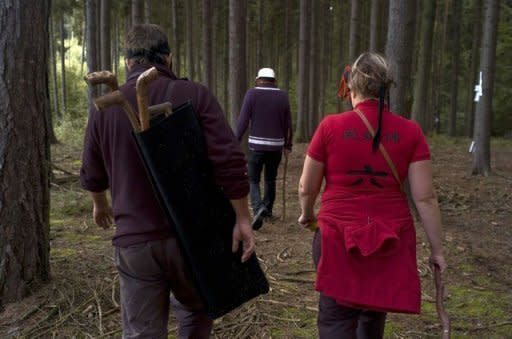Czech forest golfers make an extreme sport of game
A club roughly hewn from a freshly chopped cherry branch, a tennis ball and a buddy to play with is all it takes to make golf an extreme sport that would test the skills of even top professional players. Over the last decade, a group of Czech "forest golfers" have pioneered a novel approach to this gentleman's sport in the wilds of Bohemia on terrain that would usually be out of bounds on a regular golf course. "The idea was born when two friends at a summer camp decided to introduce the kids to golf," says Jiri "George" Rehor, a teacher and veteran forest golfer. "Besides playing, they wanted the kids to make the equipment themselves. When they returned home, they were thrilled with their idea and asked their friends to join them." The sport has caught on, with dozens of Czechs competing up to nine times a year at forest golf tournaments played across the republic, including both singles and team events. On a sunny September Sunday morning in a lush forest in Uvaly just east of the capital Prague, about 20 extreme golfers are testing their skills on a rough 10-hole course crossed by a yawning ditch. Most have come equipped with clubs made of walnut, sour cherry or other harder types of wood, a tennis ball or two and snacks, sometimes including a bottle of hard liquor. "You can bring the club with you or make one on the spot," laughs Rehor, sporting four clubs and joking that a new club or a set of tennis balls make a perfect birthday gift for him. The club must pass through a testing tube that is 10 centimetres (four inches) wide, according to the forest golf rule book on the golfers' meticulously maintained website, which includes a link to their Facebook page. Instead of regular tees, forest golfers use spruce cones broken in halves, while tennis balls replace regular golf balls, which are too tiny for the terrain. "It also hurts like hell when you get hit by a golf ball," says Rehor, as a few balls ricochet off trees at the height of the players' heads. As a rule, players wear hats or caps, and men sport colourful, often outlandish, ties. "We also had to wear sandals but that rule was abandoned after the first tournament on snow," says devoted forest golfer Daniel Suk. Leona, a woman who has come with her husband and two children, tees off from a hill towards a hole hidden behind a tree about 40 metres (120 feet) away. To her dismay, her daughter hits a tiny pine, while a family friend whacks the ball against a tall spruce; it rebounds onto a cushion of light-green moss. "You're on the green," Leona chuckles, before scoring an impressive -9 on the par-15 hole -- the usual limit for forest golfers. The players help each other by bending short trees that are in the way. The rules allow that trees can be bent, but not broken. Forest golfers held their first tournament in 1999. "We've been playing full seasons and had fixed rules since 2000," says Rehor. There's no age limit. Sunday players at Uvaly range from young children, their parents to players over 60 and all play by the motto "fun that we're dead serious about". "I've been playing for seven years and I've won four seasons," 63-year-old Vaclav Hajek chimes with pride as he skillfully sinks a tennis ball in a hole just an inch wider than the ball itself, hidden between the roots of a tall spruce. "I used to practise at work, in an asphalt yard, aiming at a gutter pipe. "I've won 32 out of 43 tournaments. I'd be ticked off to see the young ones beat an old dog like me," he said, laughing. Like most forest golfers, Hajek has never tried regular golf, but Rehor says he'd love to try a real course once. "But that's really expensive. Here in the forest I take a walk for free, shell out 20-50 koruna (roughly 1-2 euros or dollars) for the chocolate medals and diplomas, and that's it," he says. As there are no swish club houses on this golf course, players head off to a humble pub for the awards ceremony, washed down by a beer or two. While regular golf has made it to the 2016 Olympics in Rio de Janeiro, Czech forest golfers would rather not see an Olympic future for their discipline. "I'm happy playing with 50 people, the forest is much more quiet like this," says Rehor, a two-time tournament winner this season. "Although it's pleasant to go home with the medal hanging down your neck," he laughs.




